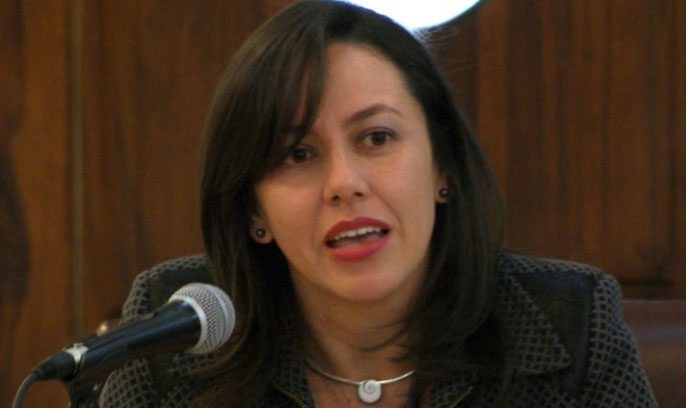
Published 13/08/2023 16:41 | Edited 8/14/2023 3:44 PM
Before being forced to call new elections for next Sunday (20), the president of Ecuador Guillermo Lasso proposed a “reform” of Social Security, which gives financial speculators the Ecuadorian Institute of Social Security (IESS), as agreed with the Fund International Monetary Fund (IMF). A commission created by Lasso indicates the increase of contributions from 30 to 35 years and the reduction of pensions, paving the way for privatization.
In an interview, Katiuska King, former Minister of Economy in the government of Rafael Correa and PhD in Development Studies, denounced the maneuver: “they want to increase the participation of the financial market, they want more speculation and profit and not improvements for the system”.
She argues that the electoral campaign should be a time for debate on structural problems, and not just on their apparent effects. “There is talk of the symptoms that one sees on the outside, and little about the structural roots”.
“That’s why they repeat the same litany all the time, that the Social Security system is broken, that it never works. They force a kind of disenchantment”, warned the professor and researcher at the Central University of Ecuador. “We defend the strengthening of the State”, she underlined.
Read the former minister’s interview:

There is an electoral dispute in which President Guillermo Lasso tries to continue governing by decrees, weakening the role of the State. You have denounced the privatization project in relation to Social Security. what is at stake?
It is very important and is inscribed in the Constitution to value the role of the State in favor of a better society, proposed in Sumak kawsay [o Bem Viver na cosmovisão quéchua], constitutionally guaranteed. As it represents rights, it displeases certain sectors of the country that have proposed “reforms” to the Constitution.
We defend that the strengthening of the State goes through several issues, which represents an increase in collection and also better spending, directed at the portion that most needs it. The reinvigoration of the State passes through Social Security, which mainly covers people in a situation of dependency.
The Ecuadorian Constitution proposes that security be aimed at the entire population, not just those in the weakest situation, but aimed at universality.
This is important because in Ecuador, as well as in Latin America, we have many people who work without a formal job, having to look for other ways to earn a living, autonomously, on their own. In our country, one out of three people work without being covered by Social Security.
This population, which is very large and outside the formal market, should be covered. And here we have problems. The Security system was designed for countries where informality almost did not exist. Society has changed, so this system needs to change too. On the one hand, people live longer and on the other there are fewer quota holders in the system, which needs to change in order to be sustainable.
There are interests in the financial sector to move towards the individual capitalization system, like Chile’s. We know it as a model where people don’t need help, where everyone pays for their own. There is nothing of solidarity and those with low or precarious incomes will not even get pensions.
Obviously, they are not talking about the practical problems that Chileans had with Pension Fund Administrators (AFP), with their low income or the low pensions paid to retirees.
In the individual capitalization system there is nothing of solidarity and those with low or precarious incomes will not even get pensions”
When you have this model, you have the savings system. That’s when there are several institutions that, in theory, can help you guarantee your pension, or retirement. But what is done is not guaranteeing a Social Security right, but concentrating resources in a few hands, and it is not even possible to guarantee that pensions will be paid. This situation is serious.
In Mexico, this individual capitalization system also works, they have several systems. They made a change a little later than Chile, and the State had to intervene and pay what was apparently financed. People contributed, speculators got rich and didn’t pay, causing people to protest and the State to subsidize. Changes must be made that respect the principles of solidarity and equity.
It’s an unpopular issue and that’s why candidates who defend retrogression are often omitted, while their campaigns are financed to defend the interests of private cartels. How is this unmasked?
A couple of years ago I wrote the article “Omens of bankruptcy as self-fulfilling prophecies and the prelude to the AFP” [Los presagios de quiebra como profecías autocumplidas y antesala de las AFP] in which I point out that they repeat the same litany all the time, that the Social Security system is broken, that it never works. They force a kind of disenchantment, of low credibility. This repetitive speech does not come from now. The process comes from three decades ago, when they wanted to implement a private capitalization system. In 1995, a consultation was held and people voted for No, which won with more than 60%.
It is an attack that comes from afar…
Exactly, it’s not something recent, they’ve wanted to implement a model that failed for a long time, like in other countries. Now this proposal presents something that we must be attentive to understand. They maintain the current system, and plan to make the issue of personal capitalization mandatory, by private or public institutions, and also maintain the support system for people in vulnerable situations. They want to establish a ceiling for the contribution of State resources, according to the Gross Domestic Product (GDP).
They want to expand the participation of the financial market, they want more speculation and profit for speculators and not improvements for the system”
It is very clear that they are not thinking about how to make the system sustainable, but about strengthening individual capital and not about including outsiders. What they do is expand the participation of the financial market, they want more speculation and profit for speculators and not improvements for the system.
As a former minister, on the eve of the elections, how do you assess that the media are acting in relation to these interests, which finance them?
When we have a public position we have a public voice, and it is possible to balance private interests. Right now, the media theme is terrible. What they do is interview only analysts who have the same positions, there is no room for plurality, there is no room for different voices, for alternative views. This makes people feel hopeless. And this is not just a single means of communication, it is a whole chain in which they appear and repeat the same theme, in different ways, hiding their interests. They repeatedly make the speech that Social Security is broken, they make an unrealistic diagnosis. They claim that pensions have a sustainability problem. But this is not the only problem, and we have to fix them. There are many resources that we have lost, for example in Health, and this is not being discussed. In fact, they say: if you have a private system, you don’t need to pay for the public health system. They are doing a partial reform, on a part, and they are not working on the whole thing. It is obvious that there are financial interests behind it.
Next Sunday (20) we will have a confrontation with the privatists and there is a whole manipulation, with emphasis on corpses, kidnappings and torture. They highlight violence as a cause, masking the problems, without discussing the connection with the worsening of unemployment, misery and hunger. What’s behind this?
They chose violence as a theme and, unfortunately, there is no mention of job creation. There is talk of Social Security reform without mentioning workers’ rights, employment and income generation. They confuse means and ends. They talk about commercial agreements. But what is not under discussion is the structural proposal, what we want to boost the productive sector, what will be our proposal for changing Ecuador. As we see in other countries, they talk about the symptoms that are seen on the outside, and little about the structural roots.
This is a topic: why has the crime economy grown so much in Ecuador? One of the factors is that the population that is in the informal economy has no other option. It is very important that, when growth is generated, it is accompanied by jobs. A growth that maintains the same concentrating structure in the export area, which does not generate jobs, is not going to solve things. This is a project for the country and not a two-year campaign. [o próximo mandato será tampão, até 2025], restricted to these elections, is a deeper discussion. We need a strategic vision of what we want for the future. This is lacking in our countries. Our governments don’t understand things in the long term.
CONTRIBUTE VIA PIX 10.511.324/0001-48
Agência ComunicaSul is covering the presidential elections and the National Assembly of Ecuador thanks to the support of the following entities: Hora do Povo newspaper, Diálogos do Sul, Barão de Itararé, Portal Vermelho, Correio da Cidadania, Agência Saiba Mais, Intersindical, Central dos Trabalhadores and Workers of Brazil (CTB), Single Central of Workers of Paraná (CUT-PR); Association of Social Workers and Psychologists of the Court of Justice of the State of São Paulo (AASPTJ-SP), Federation of Workers in Credit Companies of Paraná (FETEC-PR), Unions of Workers in Water, Waste and Environment of the State of São Paulo (Sintaema-SP) and Santa Catarina (Sintaema-SC), Union of Workers in the Heavy Construction Industries of the State of Paraná (Sintrapav-PR), Union of Official Education Teachers of the State of São Paulo ( Apeoesp Sudeste-Center), Union of Writers in the State of São Paulo, Union of Workers in the Federal Judiciary Power of Santa Catarina (Sintrajusc-SC); Union of Workers in the Judiciary Power of the State of Santa Catarina (Sinjusc-SC), popular mandate of councilor Werner Rempel (Santa Maria-RS) and dozens of individual contributions.
Source: vermelho.org.br

